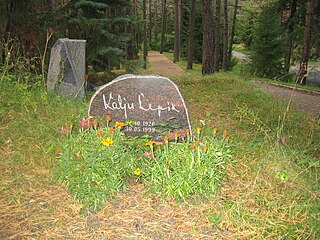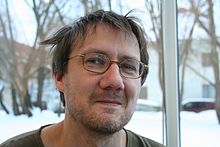
John Lawrence Ashbery was an American poet and art critic.

Elo Viiding is an Estonian poet and prose writer.
Maksim Smirnov is a retired Estonian professional footballer. He played the position of midfielder.
Wesleyan University Press is a university press that is part of Wesleyan University in Middletown, Connecticut. The press is currently directed by Suzanna Tamminen, a published poet and essayist.

Nõmme Kalju FC, commonly known as Nõmme Kalju, or simply as Kalju, is a professional football club based in Nõmme, Tallinn, that competes in the Meistriliiga, the top flight of Estonian football. The club's home ground is Hiiu Stadium.

Jaak Urmet is an Estonian writer.
Maurice Riordan is an Irish poet, translator, and editor.

Estonian literature is literature written in the Estonian language Estonia leads the world in book ownership, on average Estonians own 218 books per house, and 35% own 350 books or more.

Jüri Talvet is an Estonian poet and academic. He is the author of various literary works including poetry, criticism, and essays.

Kalju Lepik was an Estonian poet who lived as an exile for most of his life.
Fatos Arapi was an Albanian poet, short story writer, translator and journalist. Arapi's publications have been highly praised by his readers and his peers and have been awarded various national and international poetry prizes. In 2008 Arapi became the first Albanian poet to win the Golden Wreath Award.

Sergei Soldatov was one of the founders of anti-Soviet dissident movement in Estonia.

Yuyutsu Ram Dass Sharma is a Nepalese-Indian poet and journalist. He was born at Nakodar, Punjab and moved to Nepal at an early age. He writes in English and Nepali.

Kalju Orro is an Estonian stage, film and television actor, acting instructor, lecturer, theatre producer, and pedagogue.

Andres Ehin was an Estonian writer and translator. In 1964 he graduated from University of Tartu, studying Estonian philology. From 1972 to 1974 he was the senior scientific editor of Estonian Soviet Encyclopaedia. From 1972 he was a member of Estonian Writers' Union. From 1968 to 1989 he was a member of Communist Party. In 1990 he joined Estonian Social Democratic Party.
Kalev Kesküla was an Estonian journalist and writer.
Juhan Sütiste was an Estonian poet.

Aado Lintrop is an Estonian poet, religious researcher and folklorist.

Jürgen Rooste is an Estonian poet.
Veronika Kivisilla is an Estonian poet and literary critic, possibly best known for her publications Kallis kalender (2011), Cantus Firmus (2015), Kuni armastus peale tuleb (2018), and Salutatio (2019).













